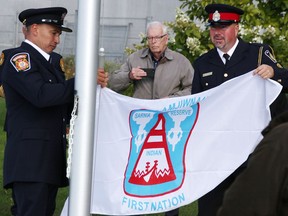
A long-pending summit looking at how Sarnia can implement the United Nations Declaration on the Rights of Indigenous Peoples might happen next year, a city councilor says.
Advertisement 2
Article content
But turnover in the city UNDRIP working group, and disruptions amid the COVID-19 pandemic have made for a long process since the idea was first raised in 2018, said Brian White, also a member of the group.
Article content
“We’ve had to essentially restart this conversation several times on how to approach a broader community-engagement strategy” to ensure everyone’s voice is being heard, he said.
The latest plans were to host a summit, also referred to by the group as a “community conversation,” this fall, he said.
“We had done the work with (a consultant) and… were ready to go” but the consultant backed out for personal reasons, he said.
The group selected another and recently received council’s blessing for city staff to firm up details for 2024. $25,000 city budget item for the facilitator also is rolling over to next year.
Advertisement 3
Article content
“It’s my hope we will be engaging within the first quarter or second quarter,” White said, adding “we are working on an as-soon-as-possible scenario” for the gathering.
Venue and other costs could be covered by sponsors, White said.
Plans are for the facilitator, Cambium Indigenous Professional Services Inc., to first consult with local First Nations and Sarnia’s urban Indigenous community, as well as give city staff Indigenous awareness training, city officials said in a report.
Part of that is to help avoid “tokenism” at summit talks, White said, noting the input gathered is expected to be foundational in Sarnia’s approach to UNDRIP.
Broadly, the UN document is an attestation of Indigenous people’s rights to foster their own languages, cultures and communities, while also having equitable access to things such as health care, education and jobs, city officials have said.
Advertisement 4
Article content
The federal government released it’s own implementation plan earlier this year, containing 131 measures.
There are limitations to what municipalities can do under the Municipal Act, White said, so the groundwork before hand is also about ensuring the community conversation focuses on things in the city’s control.
That could be welcome signs at city hall, training for front-line workers on recognizing and dealing with inter-generational trauma, creating more space for ceremony — like a healing forest project the working group and others are eyeing — and providing historical context along with territorial acknowledgments, like the one read before city council meetingshe said.
“While we recognize the limitations of our own capacity, we want to make sure that we are doing everything within those limitations, in some ways, to nudge our counterparts at other levels of government,” he said.
Advertisement 5
Article content
Having a conversation about whether Indian Road’s name should be changed is something else to consider, he said.
“The idea (of the summit) at it’s core, is very simple,” he said.
“It’s to ask a question out loud: What is important? What are we doing right, if anything? What are we not doing well? And what articles of UNDRIP should we be focusing on?”
The foundational goal is being an inclusive, respectful community that recognizes its history, he said.
“And can we serve as an example to other levels of government where, so far, they don’t seem to be acting beyond words.”
Council’s territorial declaration, short flag featuring local First Nations’ banners and orange crosswalks in the community are some of the initiatives of which the committee has been part during the interim.
City officials at a recent council meeting also noted Sarnia’s relationship with Aamjiwnaang First Nation has been positive for several years.
With files from the Canadian Press
Article content